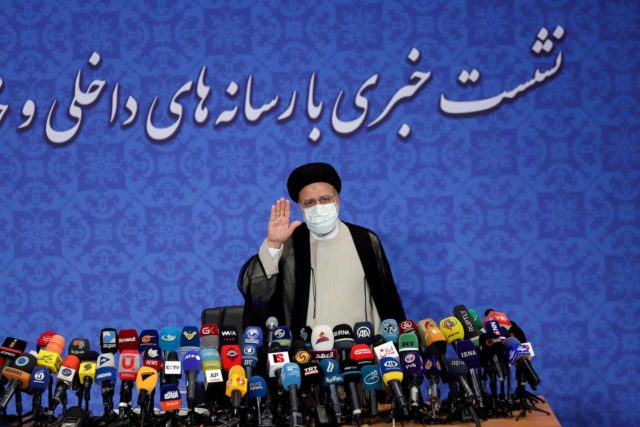It is the height of chutzpah to assume that others want what you want or want to help you get what you want when it isn’t what they want. Americans do it often, and the result is always the same: good news for those who take our inducements while having no intention of cooperating and bad news for the United States and for those who trust in it. In the case of Iran, first the Obama administration and now the Biden administration have taken the position that diplomacy and money will produce a constructive player in the region—i.e., what we want.
Iran’s plans, on the other hand, include control of militias that control Iraq, Syria, Lebanon and Yemen for the encirclement of Israel, Jordan and Saudi Arabia. Its plans include control of the narrow exits from the Persian Gulf and the Red Sea, including the 18-mile-wide Bab el Mandeb Straits opposite the U.S. military base in Djibouti. Its plans include nuclear weapons and ballistic-missile technology. Its plans include the lifting of sanctions on key members of its establishment as well as key industries. Its plans are based in its theology; they are fundamental, with no pun.
The disastrous Biden policy has abandoned longtime American allies and paid Tehran a series of dividends with no agreement by Iran to curtail its abhorrent behavior at home or abroad.
First was a little-noticed agreement with South Korea to permit the unfreezing of at least a billion dollars in Iranian assets after Iran hijacked a South Korean ship. The South Koreans were holding almost $8 billion. The mullahs used some of the money to pay its arrears to the United Nations and have its voting privileges restored—a “two-fer,” so to speak.
Second was removing the terrorist designation from the Iranian-armed and trained Houthi rebels in Yemen. The result, according to the international watchdog criticalthreats.org is that the movement “has increased its attack rate significantly since mid-February 2021 and appears to be sustaining this higher frequency. The group attempted a bold drone and ballistic-missile attack on March 7 that targeted Saudi oil facilities in Ras Tanura in Saudi Arabia’s Eastern region. The Houthis claimed the latter attack as part of their ‘balanced deterrence’ campaign.”
Other people call it a “freebie.”
Third, the Biden administration has announced it will be removing most U.S. air-defense systems from the Persian Gulf, Saudi Arabia, Iraq, Jordan and Kuwait. Sources say the administration believes those countries can defend themselves and that U.S. air defenses are needed elsewhere. More likely, the administration thinks that Iran will be more forthcoming if the United States makes it clear that it will not defend those countries with which we have worked since the British left the region in the 1960s. Countries on Iran’s “hit list.”
The announcement came just before a Reuters report that in Yemen, Houthi rebels and the internationally recognized government of Mansour Hadi are trying to work out an end to the war in which the Houthis are supported by Iran and the exiled government by Saudi Arabia. The Houthis demand the opening of the airport and port that they control, “without impossible conditions or other measures that would restore the blockade in other forms. … After that, we will discuss a comprehensive ceasefire which should be a real halt of hostilities, not a fragile truce, and that would include the exit of foreign powers from Yemen to facilitate political negotiations.”
Unsurprisingly, the Saudi government says it doesn’t have the terms yet, but it knows its air defenses are being preemptively thinned by the United States.
A settlement in Yemen is much to be desired, although the history of agreements among factions suggests that it will be more of a pause than a long-term peace. But for however long it lasts, it will benefit Iran in its long-term aspirations in the region—all of which are inimical to American security interests and those of our regional partners.
How do we know for sure?
Listen to Ebrahim Raisi, the appointed liaison of the Supreme Leader Ayatollah Ali Khamenei. The word “elected” doesn’t apply, nor does “president.” Chosen by the Guardian Council of Iran, Raisi’s job is to express publicly the privately determined positions of Khamenei. That makes what he says more, not less, important.
In a press conference, Raisi said he would not meet with President Joe Biden, would not negotiate over “support of regional militias,” not negotiate over Iran’s ballistic missile nor tie the country’s foreign policy to the JCPOA. He added that the United States has an obligation to lift all—repeat, all—sanctions on Tehran, and dismissed a question about his participation in panels that sentenced more than 5,000 people to death in 1988 after the end of the Iran-Iraq war, saying he was a “defender of human rights.”
If, after that, you believe that Iran might want what the United States might want, then it’s chutzpah, nothing more.






